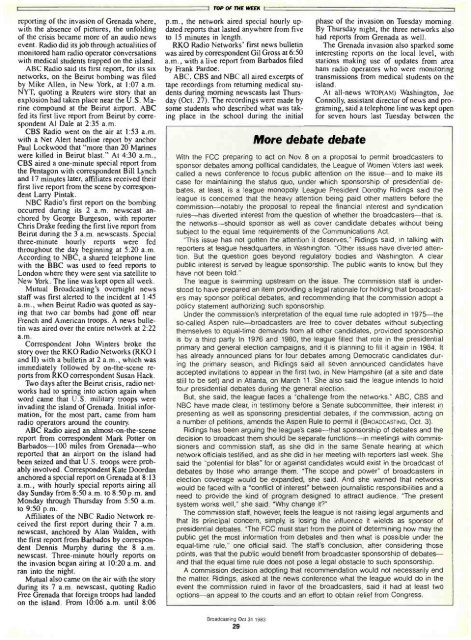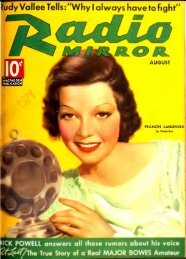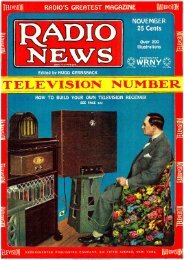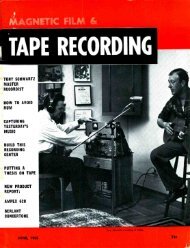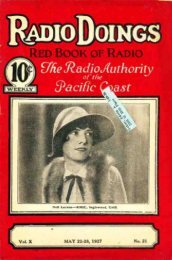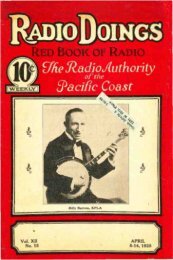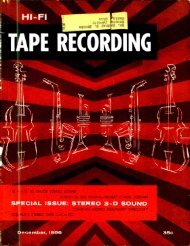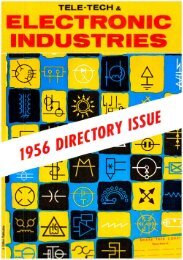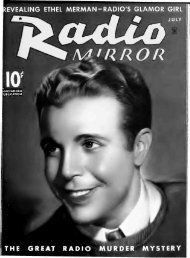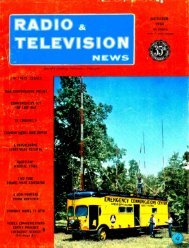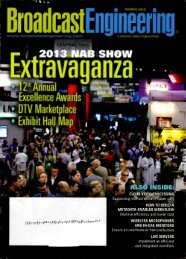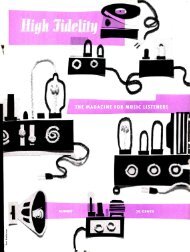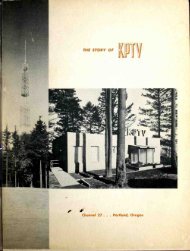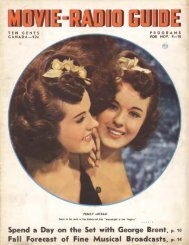Broadcasting Oct 31 - American Radio History
Broadcasting Oct 31 - American Radio History
Broadcasting Oct 31 - American Radio History
You also want an ePaper? Increase the reach of your titles
YUMPU automatically turns print PDFs into web optimized ePapers that Google loves.
eporting of the invasion of Grenada where,<br />
with the absence of pictures, the unfolding<br />
of the crisis became more of an audio news<br />
event. <strong>Radio</strong> did its job through actualities of<br />
monitored ham radio operator conversations<br />
with medical students trapped on the island.<br />
ABC <strong>Radio</strong> said its first report, for its six<br />
networks, on the Beirut bombing was filed<br />
by Mike Allen, in New York, at 1:07 a.m.<br />
NYT, quoting a Reuters wire story that an<br />
explosion had taken place near the U.S. Ma-<br />
rine compound at the Beirut airport. ABC<br />
fed its first live report from Beirut by corre-<br />
spondent Al Dale at 2:35 a.m.<br />
CBS <strong>Radio</strong> went on the air at 1:53 a.m.<br />
with a Net Alert headline report by anchor<br />
Paul Lockwood that "more than 20 Marines<br />
were killed in Beirut blast." At 4:30 a.m.,<br />
CBS aired a one -minute special report from<br />
the Pentagon with correspondent Bill Lynch<br />
and 17 minutes later, affiliates received their<br />
first live report from the scene by correspon-<br />
dent Larry Pintak.<br />
NBC <strong>Radio</strong>'s first report on the bombing<br />
occurred during its 2 a.m. newscast an-<br />
chored by George Burgeson, with reporter<br />
Chris Drake feeding the first live report from<br />
Beirut during the 3 a.m. newscasts. Special<br />
three- minute hourly reports were fed<br />
throughout the day beginning at 5:20 a.m.<br />
According to NBC, a shared telephone line<br />
with the BBC was used to feed reports to<br />
London where they were sent via satellite to<br />
New York. The line was kept open all week.<br />
Mutual <strong>Broadcasting</strong>'s overnight news<br />
staff was first alerted to the incident at 1:45<br />
a.m., when Beirut <strong>Radio</strong> was quoted as say-<br />
ing that two car bombs had gone off near<br />
French and <strong>American</strong> troops. A news bulle-<br />
tin was aired over the entire network at 2:22<br />
a.m.<br />
Correspondent John Winters broke the<br />
story over the RKO <strong>Radio</strong> Networks (RKO I<br />
and II) with a bulletin at 2 a.m., which was<br />
immediately followed by on- the -scene re-<br />
ports from RKO correspondent Susan Hack.<br />
'Iivo days after the Beirut crisis, radio net-<br />
works had to spring into action again when<br />
word came that U.S. military troops were<br />
invading the island of Grenada. Initial infor-<br />
mation, for the most part, came from ham<br />
radio operators around the country.<br />
ABC <strong>Radio</strong> aired an almost -on- the -scene<br />
report from correspondent Mark Potter on<br />
Barbados -100 miles from Grenada -who<br />
reported that an airport on the island had<br />
been seized and that U.S. troops were prob-<br />
ably involved. Correspondent Kate Doordan<br />
anchored a special report on Grenada at 8:13<br />
a.m., with hourly special reports airing all<br />
day Sunday from 8:50 a.m. to 8:50 p.m. and<br />
Monday through Thursday from 5:50 a.m.<br />
to 9:50 p.m.<br />
Affiliates of the NBC <strong>Radio</strong> Network re-<br />
ceived the first report during their 7 a.m.<br />
newscast, anchored by Alan Walden, with<br />
the first report from Barbados by correspon-<br />
dent Dennis Murphy during the 8 a.m.<br />
newscast. Three- minute hourly reports on<br />
the invasion began airing at 10:20 a.m. and<br />
ran into the night.<br />
Mutual also came on the air with the story<br />
during its 7 a.m. newscast, quoting <strong>Radio</strong><br />
Free Grenada that foreign troops had landed<br />
on the island. From 10:06 a.m. until 8:06<br />
TOP OF THE MEEK 1<br />
p.m., the network aired special hourly up-<br />
dated reports that lasted anywhere from five<br />
to 15 minutes in length.<br />
RKO <strong>Radio</strong> Networks' first news bulletin<br />
was aired by correspondent Gil Gross at 6:50<br />
a.m., with a live report from Barbados filed<br />
by Frank Pardue.<br />
ABC, CBS and NBC all aired excerpts of<br />
tape recordings from returning medical stu-<br />
dents during morning newscasts last Thurs-<br />
day (<strong>Oct</strong>. 27). The recordings were made by<br />
some students who described what was tak-<br />
ing place in the school during the initial<br />
More debate debate<br />
phase of the invasion on Tuesday morning.<br />
By Thursday night, the three networks also<br />
had reports from Grenada as well.<br />
The Grenada invasion also sparked some<br />
interesting reports on the local level, with<br />
stations making use of updates from area<br />
ham radio operators who were monitoring<br />
transmissions from medical students on the<br />
island.<br />
At all -news wroP(AM) Washington, Joe<br />
Connolly, assistant director of news and pro-<br />
graming, said a telephone line was kept open<br />
for seven hours last Tuesday between the<br />
With the FCC preparing to act on Nov 8 on a proposal to permit broadcasters to<br />
sponsor debates among political candidates, the League of Women haters last week<br />
called a news conference to focus public attention on the issue -and to make its<br />
case for maintaining the status quo, under which sponsorship of presidential de-<br />
bates, at least, is a league monopoly. League President Dorothy Ridings said the<br />
league is concerned that the heavy attention being paid other matters before the<br />
commission -notably the proposal to repeal the financial interest and syndication<br />
rules -has diverted interest from the question of whether the broadcasters -that is,<br />
the networks -should sponsor as well as cover candidate debates without being<br />
subject to the equal time requirements of the Communications Act.<br />
"This issue has not gotten the attention it deserves," Ridings said, in talking with<br />
reporters at league headquarters, in Washington. "Other issues have diverted atten-<br />
tion. But the question goes beyond regulatory bodies and Washington. A clear<br />
public interest is served by league sponsorship. The public wants to know, but they<br />
have not been told."<br />
The league is swimming upstream on the issue. The commission staff is under-<br />
stood to have prepared an item providing a legal rationale for holding that broadcast-<br />
ers may sponsor political debates, and recommending that the commission adopt a<br />
policy statement authorizing such sponsorship.<br />
Under the commissions interpretation of the equal time rule adopted in 1975 -the<br />
so- called Aspen rule- broadcasters are free to cover debates without subjecting<br />
themselves to equal -time demands from all other candidates, provided sponsorship<br />
is by a third party. In 1976 and 1980, the league filled that role in the presidential<br />
primary and general election campaigns, and it is planning to fill it again in 1984. It<br />
has already announced plans for four debates among Democratic candidates dur-<br />
ing the primary season, and Ridings said all seven announced candidates have<br />
accepted invitations to appear in the first two, in New Hampshire (at a site and date<br />
still to be set) and in Atlanta, on March 11. She also said the league intends to hold<br />
four presidential debates during the general election.<br />
But, she said, the league faces a "challenge from the networks." ABC, CBS and<br />
NBC have made clear, in testimony before a Senate subcommittee, their interest in<br />
presenting as well as sponsoring presidential debates, if the commission, acting on<br />
a number of petitions, amends the Aspen Rule to permit it (BROADCASTING, <strong>Oct</strong>. 3).<br />
Ridings has been arguing the league's case -that sponsorship of debates and the<br />
decision to broadcast them should be separate functions -in meetings with commis-<br />
sioners and commission staff, as she did in the same Senate hearing at which<br />
network officials testified, and as she did in her meeting with reporters last week. She<br />
said the "potential for bias" for or against candidates would exist in the broadcast of<br />
debates by those who arrange them. "The scope and power" of broadcasters in<br />
election coverage would be expanded, she said. And she warned that networks<br />
would be faced with a "conflict of interest" between journalistic responsibilities and a<br />
need to provide the kind of program designed to attract audience. "The present<br />
system works well," she said. "Why change it ?"<br />
The commission staff, however, feels the league is not raising legal arguments and<br />
that its principal concern, simply, is losing the influence it wields as sponsor of<br />
presidential debates. "The FCC must start from the point of determining how may the<br />
public get the most information from debates and then what is possible under the<br />
equal -time rule," one official said. The staff's conclusion, after considering those<br />
points, was that the public would benefit from broadcaster sponsorship of debates -<br />
and that the equal time rule does not pose a legal obstacle to such sponsorship.<br />
A commission decision adopting that recommendation would not necessarily end<br />
the matter. Ridings, asked at the news conference what the league would do in the<br />
event the commission ruled in favor of the broadcasters, said it had at least two<br />
options -an appeal to the courts and an effort to obtain relief from Congress.<br />
<strong>Broadcasting</strong> <strong>Oct</strong> <strong>31</strong> 1983<br />
29


